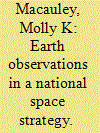| Srl | Item |
| 1 |
ID:
101229


|
|
|
|
|
| Publication |
2010.
|
| Summary/Abstract |
Natural and environmental resources, ranging from supplies of fossil fuels to agricultural productivity, have long been recognized as part of the natural wealth of nations. Earth observations from the vantage point of space provide a unique means of understanding, measuring, and monitoring these resources both domestically and globally. This article argues that design of a national space strategy includes recognition of this role of Earth observations, and accords them priority commensurate with the value of the resources they observe. Recognizing the overlap between a national space strategy and a national security strategy, the article notes examples of the complementarities between Earth observations data from civilian and national security observing systems. The limited public transparency of data from national security sources hinders their usefulness in informing many policy decisions, however. The article also considers whether international cooperation in Earth observations, as in other national space activities, is warranted or workable in a national space strategy.
|
|
|
|
|
|
|
|
|
|
|
|
|
|
|
|
| 2 |
ID:
079659


|
|
|
|
|
| Publication |
2007.
|
| Summary/Abstract |
Scientists and other experts have long expressed concern about protecting the environments of other planets from human contamination. Their objective is to preserve those environments for the search for indigenous life and other scientific research that human contamination could confound or even preclude. Within the past few years, the United States has embarked on plans to extend human presence to other planets - notably, Mars, where the search for indigenous life is focused at present. Other countries may eventually have this goal as a long-run objective. Current international and national policies to protect other planetary environments are limited almost exclusively to governance of robotic exploration and do not address measures to be taken during activities conducted by humans. This article borrows from the domain of environmental policy to suggest the concept of environmental sustainability as a possible framework to mediate conflicting objectives associated with extending human presence in space. A key conclusion is that defining a balancing test to achieve sustainability requires more systematic and thorough discussion of rationales for an extended human space presence - a difficult but necessary dialog for achieving the stated goals of planetary protection
|
|
|
|
|
|
|
|
|
|
|
|
|
|
|
|